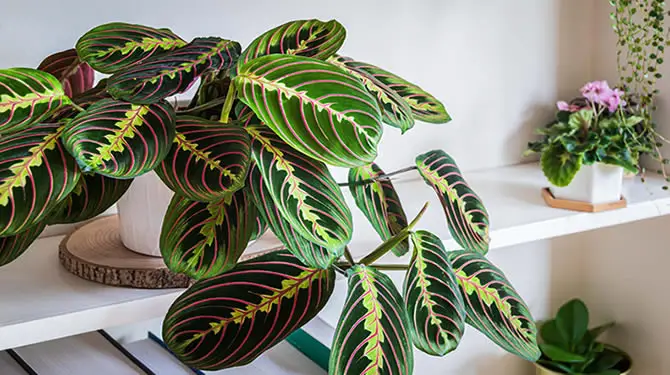How To Propagate Maranta (Prayer Plant): Two Easy Methods for New Growth

The Maranta leuconeura, known as the “true” Prayer Plant (not to be confused with the Calathea prayer plant), is beloved for its vibrant foliage and the way its leaves fold up at night like hands in prayer. Luckily, it’s also one of the easiest tropicals to propagate, making it perfect for houseplant lovers who want more without buying new plants.
Whether you prefer rooting in water or dividing at the root, this guide breaks down exactly how to multiply your Maranta Prayer Plant step by step.
Table of Contents
When To Propagate Maranta Prayer Plant
Like most tropicals, timing matters for the fastest and healthiest results.
Best time:
Spring through early summer — when the plant is actively growing and most resilient
Avoid:
Late autumn or winter, when rooting is slow and stress tolerance is lower
If you’re repotting or pruning in spring, it’s the perfect time to propagate extra plants.
What You’ll Need
Maranta propagation is low-effort and highly rewarding.
Gather these materials:
-
Small jars (for water rooting) or nursery pots (for soil)
-
Potting mix: see recipe below (if using store-bought soil then tropical soil is best)
-
Rooting hormone (optional but recommended)
-
Plastic wrap or humidity dome (for soil propagation)
-
Labels (optional)
Method 1: Stem Cuttings in Water
This is the easiest and most visually satisfying method — and it works fast.
Step-by-step:
-
Choose a healthy stem with at least one node and a few leaves.
-
Cut just below a node — this is where roots will form.
-
Remove any lower leaves that would be submerged in water.
-
Place the cutting in a jar with clean, room-temperature water, ensuring the node is fully submerged.
-
Set in bright, indirect light. Avoid harsh sun.
-
Change the water every 3–5 days to keep it fresh.
Roots usually form within 10–14 days, and you can plant the cutting once they’re 1–2 inches long.
Method 2: Root Division
If your Maranta is full and bushy, you can divide it into multiple plants during repotting.
Step-by-step:
-
Remove the plant from its pot and gently shake off excess soil.
-
Locate natural clumps — Maranta often grows in small clusters connected by rhizomes.
-
Tease or cut apart sections, ensuring each has roots and 3–5 leaves.
-
Repot each division into a small pot with fresh, lightly moistened soil.
-
Water gently and cover with a plastic bag or humidity dome to reduce transplant stress.
-
Place in bright, indirect light, and keep warm and humid.
New growth will appear within 3–4 weeks, often sooner with ideal care.
Best Soil for Rooted Cuttings and Divisions
Maranta prefers moisture-retentive, breathable soil.
Here’s the perfect blend:
-
50% peat or coco coir
-
25% perlite
-
25% orchid bark or compost
Keep the mix evenly moist but never soggy. Good drainage is key to preventing root rot.
Post-Propagation Care
Both cuttings and divisions will thrive with a little extra care during the adjustment phase.
-
Humidity: Maintain 60–70% humidity (use a pebble tray or cover if needed)
-
Light: Bright, indirect light — no direct sun
-
Water: Keep soil lightly moist; avoid letting it dry out completely
-
Fertilizer: Wait 4–6 weeks before feeding
-
Temperature: 65–80°F (18–27°C) is ideal
Droopy or limp leaves after transplant are normal — they’ll rebound as roots take hold.
Signs of Propagation Success
You’ll know it’s working when:
-
New leaves begin to emerge
-
Roots are visible (in water or through drainage holes)
-
The plant regains perky, upright posture
Keep an eye out for early yellowing or rot, which often indicates too much moisture or poor airflow.

Can You Propagate Maranta From Seeds?
Technically yes — but it’s not common or recommended for home growers.
Seeds are hard to source, slow to sprout, and often produce weaker plants.
Stem cuttings or division are faster, easier, and more reliable.
Common Mistakes To Avoid
Even with a forgiving plant like Maranta, watch out for:
-
❌ Submerging leaves in water → leads to rot
-
❌ Skipping the node → no node = no roots
-
❌ Dense or soggy soil → suffocates new roots
-
❌ Too little light → slows root formation
-
❌ Over-fertilizing too early → can burn fragile new roots
Final Word
Maranta Prayer Plant propagation is quick, beginner-friendly, and highly satisfying — especially if you love sharing plants.
Whether you’re using a water jar or dividing an overgrown pot, you’ll have lush new foliage in just a few weeks.
With their vibrant leaves and rhythmic movement, every new plant feels like a little gift that folds its hands in thanks.
🧭 Want to help your new cuttings flourish? The article Prayer Plant Care (Maranta): How to Grow a Leafy Beauty That Moves with the Light covers light, watering, and humidity in full detail.
Thanks for reading! I'm Michael — houseplant fanatic and your Pinterest plant guide.
Follow me on Pinterest for fresh updates 🌿





